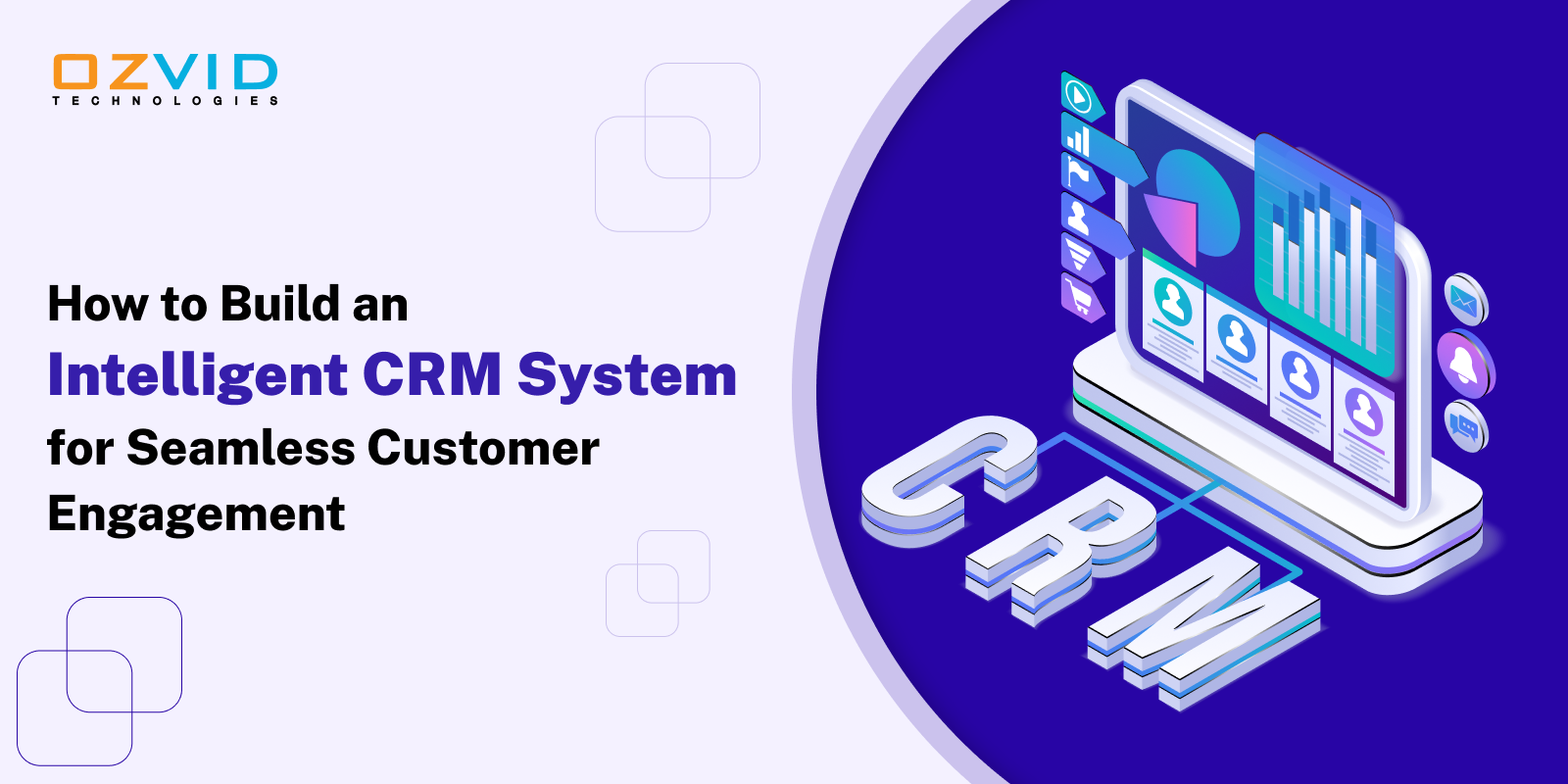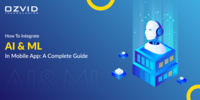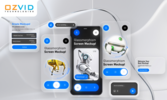- Mar 13, 2025
Share this post on:

Customer engagement is the backbone of any successful business. In today’s digital age, customers expect personalized, seamless, and proactive interactions. Businesses that fail to meet these expectations risk losing customers to competitors. A Customer Relationship Management (CRM) system helps organizations manage interactions with potential and existing customers, but a traditional CRM is no longer enough.
An intelligent CRM system goes beyond simple data storage. It integrates artificial intelligence (AI), automation, predictive analytics, and omnichannel communication to provide deeper customer insights, automate repetitive tasks, and improve engagement strategies. By building an intelligent CRM, businesses can streamline processes, boost customer satisfaction, and drive revenue growth.
This comprehensive guide will take you through the step-by-step process of building an intelligent CRM system that ensures seamless customer engagement and long-term success.
Key Takeaways
- An intelligent CRM integrates AI, automation, and predictive analytics to enhance customer engagement.
- Key features include AI-driven insights, automated workflows, omnichannel communication, and real-time analytics.
- A scalable technology stack, intuitive UI, and strong security measures are crucial.
- Seamless integration with marketing, sales, and support tools ensures efficiency.
- Employee training and continuous optimization maximize CRM effectiveness.
Why an Intelligent CRM System is Essential
A standard CRM collects and organizes customer data, such as contact details, purchase history, and support interactions. While this helps businesses stay organized, it does not actively improve customer engagement. An intelligent CRM, on the other hand, learns from customer interactions, predicts their needs, and automates engagement efforts.
The Key Benefits of an Intelligent CRM System
Personalized Customer Interactions: AI-driven insights allow businesses to tailor recommendations, emails, and offers based on customer behavior.
Predictive Analytics for Better Decision-Making: Machine learning algorithms analyze customer patterns, helping businesses anticipate their needs.
Automated Workflows to Improve Efficiency: Repetitive tasks like follow-ups, lead scoring, and appointment scheduling are handled automatically.
Omnichannel Communication for Seamless Engagement: Customers can interact through their preferred channels, including email, chat, phone, and social media, all managed in one place.
Increased Sales and Retention: Businesses that engage customers at the right time with the right message experience higher conversion rates and customer loyalty.
With these advantages, an intelligent CRM becomes a powerful tool for businesses looking to stay ahead in a highly competitive market.
Step 1: Define Your Business Goals and CRM Objectives
Before developing an intelligent CRM system, businesses must define clear goals and objectives. A CRM should be customized to fit your industry, customer base, and business operations.
Questions to Consider Before Building Your CRM:
What challenges are you trying to solve? Are you looking to improve customer engagement, automate sales processes, or gain better insights into customer behavior?
What features are essential for your CRM? Do you need AI-driven analytics, automated workflows, real-time reporting, or integration with third-party applications?
Who will use the CRM? Sales teams, customer support, marketing teams, and management will all require different functionalities.
What customer data should be collected? Defining key data points—such as purchase history, website activity, and communication preferences—will ensure the CRM provides actionable insights.
By setting clear objectives, businesses can build a CRM system that aligns with their customer engagement strategies and long-term goals.
Step 2: Choose the Right Features for Your Intelligent CRM
The effectiveness of an intelligent CRM system depends on the features it offers. Businesses should focus on automation, AI-powered insights, and seamless integration with other tools.
Essential Features for an Intelligent CRM System
1. AI-Driven Customer Insights
An intelligent CRM system should leverage Artificial Intelligence to analyze customer behavior, preferences, and engagement history. Machine learning models can:
- Predict the likelihood of a customer making a purchase.
- Recommend personalized products or services.
- Identify at-risk customers and suggest retention strategies.
2. Automated Lead and Contact Management
Instead of manually sorting and following up on leads, an intelligent CRM can:
- Score leads based on engagement levels.
- Automatically assign leads to sales representatives.
- Send follow-up emails and reminders based on customer actions.
3. Omnichannel Communication Integration
Customers interact with businesses across multiple platforms, so an intelligent CRM should centralize emails, phone calls, chatbots, social media interactions, and website visits into a single dashboard.
- Automate responses to common customer queries.
- Route messages to the right team members based on customer needs.
- Track all customer interactions in real time.
4. Smart Automation for Workflows and Tasks
Manual data entry and repetitive tasks can slow down productivity. An intelligent CRM should:
- Automate email marketing campaigns.
- Schedule follow-ups and reminders.
- Sync with calendars and schedule meetings automatically.
5. Real-Time Analytics and Reporting
An intelligent CRM should provide actionable insights through real-time reports, including:
- Customer engagement trends.
- Sales pipeline performance.
- Customer satisfaction scores.
These insights help businesses make data-driven decisions and refine their customer engagement strategies.
Step 3: Develop the CRM System
Once the CRM’s objectives and features are defined, the next step is development. This involves choosing the right technology stack, designing a user-friendly interface, and ensuring data security.
1. Select the Right Technology Stack
The technology stack should be scalable, secure, and adaptable. Commonly used technologies for CRM development include:
Backend: Python, Node.js, PHP, or Java for server-side processing.
Frontend: React.js, Angular, or Vue.js for a dynamic user interface.
Database: MySQL, PostgreSQL, or MongoDB for storing customer data.
AI & Machine Learning: TensorFlow, IBM Watson, or OpenAI for predictive analytics.
2. Create an Intuitive User Interface
The CRM interface should be easy to navigate, customizable, and visually appealing.
- A dashboard with key insights should be the first thing users see.
- Drag-and-drop automation tools make it easier to set up workflows.
- Mobile responsiveness ensures accessibility on all devices.
3. Ensure Data Security and Compliance
Since CRMs handle sensitive customer information, security should be a top priority. Implement:
- End-to-end encryption to protect customer data.
- Role-based access control to limit data exposure.
- GDPR and other regulatory compliance measures to prevent legal issues.
Step 4: Integrate CRM with Existing Business Tools
For maximum efficiency, the CRM should seamlessly integrate with other business tools, including:
- Marketing Automation Software (e.g., HubSpot, Mailchimp) to enhance email campaigns.
- Customer Support Platforms (e.g., Zendesk, Freshdesk) for managing support tickets.
- ERP and Accounting Systems (e.g., SAP, QuickBooks) for financial tracking.
- E-commerce Platforms (e.g., Shopify, Magento) for better customer order management.
Integration ensures smooth data flow across departments, improving efficiency and collaboration.
Step 5: Train Employees and Optimize CRM Performance
Even the most advanced CRM system is ineffective if employees do not know how to use it properly.
- Conduct hands-on training sessions for employees.
- Create step-by-step guides and video tutorials.
- Gather feedback to continuously improve the CRM system.
Businesses should also regularly analyze CRM performance, update AI models, and improve automation workflows to keep up with customer expectations.
Conclusion
Building an intelligent CRM system is a game-changer for businesses looking to enhance customer engagement, improve sales efficiency, and boost retention rates. By incorporating AI, automation, and real-time analytics, businesses can deliver personalized, meaningful interactions at every touchpoint.
Whether you're a startup or an established enterprise, investing in an intelligent CRM by OZVID Technologies will transform the way you manage customer relationships and drive long-term success.
Are you ready to build your intelligent CRM system? Contact us today and revolutionize customer engagement!
FAQs
1. What makes a CRM system "intelligent"?
An intelligent CRM integrates AI, automation, and predictive analytics to analyze customer behavior, personalize interactions, and automate workflows. It enhances customer engagement by offering real-time insights, optimizing sales and marketing strategies, and improving overall efficiency, making business processes more customer-centric and seamless.
2. What are the essential features of an intelligent CRM?
An intelligent CRM includes AI-driven insights, workflow automation, omnichannel communication, real-time analytics, and seamless integration with business tools. It enables businesses to personalize customer interactions, track engagement, predict trends, and streamline operations. By centralizing customer data and automating tasks, it enhances efficiency and helps businesses build stronger customer relationships.
3. How can AI improve customer engagement in a CRM?
AI enhances CRM by analyzing customer data to provide personalized recommendations, automate responses, and predict customer needs. AI-powered chatbots offer instant support, while predictive analytics help businesses anticipate behaviors and improve customer retention. AI also assists in lead scoring and sales forecasting, making engagement more efficient and customer-focused.
4. What technologies are used to build an intelligent CRM?
Building an intelligent CRM requires technologies like Python, Node.js, or Java for backend development, React.js or Angular for frontend, and databases like MySQL or MongoDB for data storage. AI frameworks like TensorFlow and IBM Watson enable predictive analytics, while cloud platforms like AWS and Azure ensure scalability, security, and seamless performance.
5. How do I ensure my CRM system is user-friendly?
A user-friendly CRM should have an intuitive interface, customizable workflows, mobile accessibility, and a well-organized dashboard. Providing training materials and support ensures easy adoption. Simple navigation, real-time data access, and automation make CRM operations efficient, improving user experience and maximizing productivity for businesses and their teams.










